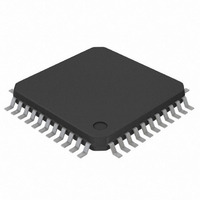DSPIC33FJ16MC304-E/PT Microchip Technology, DSPIC33FJ16MC304-E/PT Datasheet - Page 18

DSPIC33FJ16MC304-E/PT
Manufacturer Part Number
DSPIC33FJ16MC304-E/PT
Description
16-bit DSC, 16KB Flash,Motor,40 MIPS,nanoWatt 44 TQFP 10x10x1mm TRAY
Manufacturer
Microchip Technology
Series
dsPIC™ 33Fr
Specifications of DSPIC33FJ16MC304-E/PT
Core Processor
dsPIC
Core Size
16-Bit
Speed
40 MIPs
Connectivity
I²C, IrDA, LIN, SPI, UART/USART
Peripherals
Brown-out Detect/Reset, DMA, Motor Control PWM, QEI, POR, PWM, WDT
Number Of I /o
35
Program Memory Size
16KB (16K x 8)
Program Memory Type
FLASH
Ram Size
2K x 8
Voltage - Supply (vcc/vdd)
3 V ~ 3.6 V
Data Converters
A/D 9x10b/12b
Oscillator Type
Internal
Operating Temperature
-40°C ~ 125°C
Package / Case
44-TQFP, 44-VQFP
Lead Free Status / RoHS Status
Lead free / RoHS Compliant
For Use With
DM240001 - BOARD DEMO PIC24/DSPIC33/PIC32
Eeprom Size
-
Lead Free Status / RoHS Status
Lead free / RoHS Compliant
Other names
DSPIC33FJ16MC304-E/PTTR
DSPIC33FJ16MC304-E/PTTR
DSPIC33FJ16MC304-E/PTTR
Available stocks
Company
Part Number
Manufacturer
Quantity
Price
Company:
Part Number:
DSPIC33FJ16MC304-E/PT
Manufacturer:
Microchip
Quantity:
175
Company:
Part Number:
DSPIC33FJ16MC304-E/PT
Manufacturer:
Microchip Technology
Quantity:
10 000
- Current page: 18 of 320
- Download datasheet (5Mb)
dsPIC33FJ32MC202/204 and dsPIC33FJ16MC304
2.7
If the PLL of the target device is enabled and
configured for the device start-up oscillator, the
maximum oscillator source frequency must be limited
to ≤ 8 MHz for start-up with PLL enabled. This means
that if the external oscillator frequency is outside this
range, the application must start-up in FRC mode first.
The default PLL settings after a POR with an oscillator
frequency outside this range will violate the device
operating speed.
Once the device powers up, the application firmware
can initialize the PLL SFRs, CLKDIV and PLLDBF to a
suitable value, and then perform a clock switch to the
Oscillator + PLL clock source. Note that clock switching
must be enabled in the device Configuration word.
2.8
If MPLAB ICD 2, MPLAB ICD 3 or MPLAB REAL ICE™
in-circuit emulator is selected as a debugger, it auto-
matically initializes all of the A/D input pins (ANx) as
“digital” pins, by setting all bits in the AD1PCFGL regis-
ter.
The bits in the registers that correspond to the A/D pins
that are initialized by MPLAB ICD 2, MPLAB ICD 3 or
MPLAB REAL ICE™ in-circuit emulator, must not be
cleared by the user application firmware; otherwise,
communication errors will result between the debugger
and the device.
If your application needs to use certain A/D pins as
analog input pins during the debug session, the user
application must clear the corresponding bits in the
AD1PCFGL register during initialization of the ADC
module.
When MPLAB ICD 2, MPLAB ICD 3 or MPLAB REAL
ICE™ in-circuit emulator is used as a programmer, the
user application firmware must correctly configure the
AD1PCFGL register. Automatic initialization of this
register is only done during debugger operation.
Failure to correctly configure the register(s) will result in
all A/D pins being recognized as analog input pins,
resulting in the port value being read as a logic ‘0’,
which may affect user application functionality.
2.9
Unused I/O pins should be configured as outputs and
driven to a logic-low state.
Alternatively, connect a 1k to 10k resistor between V
and the unused pins.
DS70283H-page 18
Oscillator Value Conditions on
Device Start-up
Configuration of Analog and
Digital Pins During ICSP
Operations
Unused I/Os
SS
© 2011 Microchip Technology Inc.
Related parts for DSPIC33FJ16MC304-E/PT
Image
Part Number
Description
Manufacturer
Datasheet
Request
R

Part Number:
Description:
IC, DSC, 16BIT, 12KB, 40MHZ, 3.6V, DIP28
Manufacturer:
Microchip Technology
Datasheet:

Part Number:
Description:
Manufacturer:
Microchip Technology Inc.
Datasheet:

Part Number:
Description:
Manufacturer:
Microchip Technology Inc.
Datasheet:

Part Number:
Description:
Manufacturer:
Microchip Technology Inc.
Datasheet:

Part Number:
Description:
Manufacturer:
Microchip Technology Inc.
Datasheet:

Part Number:
Description:
Manufacturer:
Microchip Technology Inc.
Datasheet:

Part Number:
Description:
Manufacturer:
Microchip Technology Inc.
Datasheet:

Part Number:
Description:
Manufacturer:
Microchip Technology Inc.
Datasheet:

Part Number:
Description:
Manufacturer:
Microchip Technology Inc.
Datasheet:











